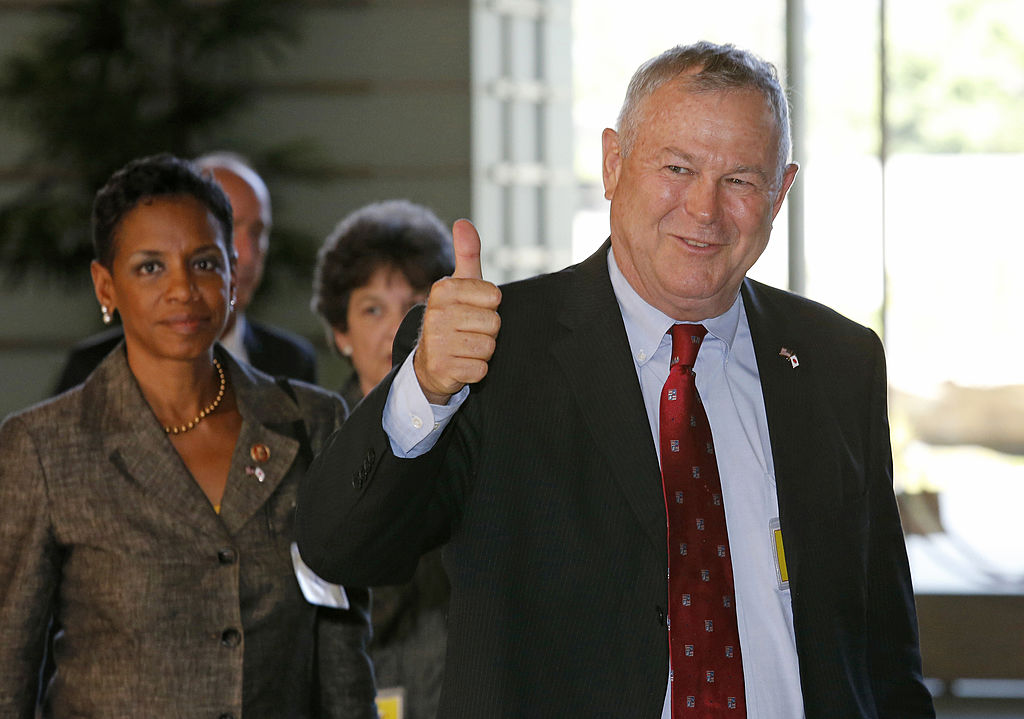Russian spies tried to recruit the GOP congressman who House GOP leaders 'joked' was on Putin's payroll


A free daily email with the biggest news stories of the day – and the best features from TheWeek.com
You are now subscribed
Your newsletter sign-up was successful
Late Wednesday, The Washington Post reported that back in June 2016, House Republicans were discussing the hack of the Democratic National Committee (WikiLeaks had not yet begun to publish the stolen emails), and House Majority Leader Kevin McCarthy suggested that "the Russians hacked the DNC and got the opp [opposition] research that they had on Trump," and when House Speaker Paul Ryan asked who they "delivered" that information to, McCarthy replied: "There's two people, I think, Putin pays: Rohrabacher and Trump. Swear to God."

After the House GOP leaders denied that the conversation ever took place, The Washington Post said there was audio of the conversation, and McCarthy called the comments a "bad attempt at a joke," pointing to laughter in the room. But it turns out that Russian spies actually did try to recruit Rep. Dana Rohrabacher (R-Calif.), one of Moscow's staunchest defenders and President Trump's loyalist allies in Washington, The New York Times reported Friday.
In a secure room, with Reps. Mike Rogers (R-Mich.) and C.A. Dutch Ruppersberger (D-Md.) present, FBI agents told Rohrabacher in 2012 that Russian agents were trying to recruit him as an "agent of influence," someone Moscow could use to steer policy, wittingly or not, former officials tell the Times, adding that the FBI did not think Rohrabacher was actively working with or accepting money from Russia. Rohrabacher said the FBI agents specifically warned him that a Russian Foreign Ministry official he met with in Moscow "had something to do with some kind of Russian intelligence" and "looked at me as someone who could be influenced." Ruppersberger recalls: "Mike and I reminded Dana that Russia is our adversary."
The Week
Escape your echo chamber. Get the facts behind the news, plus analysis from multiple perspectives.

Sign up for The Week's Free Newsletters
From our morning news briefing to a weekly Good News Newsletter, get the best of The Week delivered directly to your inbox.
From our morning news briefing to a weekly Good News Newsletter, get the best of The Week delivered directly to your inbox.
The meeting shows that "the FBI has taken seriously the possibility that Russian spies would target American politicians," The New York Times says. But while the FBI is trying to figure out any connections between Moscow and Trump's inner circle, House Republican leaders are poring over the Washington Post article to figure out who leaked their private conversation, worried that there are more leaks to come, reports Jonathan Swan at Axios. "The most widespread theory in House leadership is that the secret recorder and the leaker was Evan McMullin, who as a former leadership aide participated in the June 15 conversation and confirmed the private conversation to The Washington Post." There's no evidence that McMullin, who ran as an independent conservative presidential candidate in 2016, is the leaker.
A free daily email with the biggest news stories of the day – and the best features from TheWeek.com
Peter has worked as a news and culture writer and editor at The Week since the site's launch in 2008. He covers politics, world affairs, religion and cultural currents. His journalism career began as a copy editor at a financial newswire and has included editorial positions at The New York Times Magazine, Facts on File, and Oregon State University.
-
 The environmental cost of GLP-1s
The environmental cost of GLP-1sThe explainer Producing the drugs is a dirty process
-
 Greenland’s capital becomes ground zero for the country’s diplomatic straits
Greenland’s capital becomes ground zero for the country’s diplomatic straitsIN THE SPOTLIGHT A flurry of new consular activity in Nuuk shows how important Greenland has become to Europeans’ anxiety about American imperialism
-
 ‘This is something that happens all too often’
‘This is something that happens all too often’Instant Opinion Opinion, comment and editorials of the day
-
 House votes to end Trump’s Canada tariffs
House votes to end Trump’s Canada tariffsSpeed Read Six Republicans joined with Democrats to repeal the president’s tariffs
-
 Bondi, Democrats clash over Epstein in hearing
Bondi, Democrats clash over Epstein in hearingSpeed Read Attorney General Pam Bondi ignored survivors of convicted sex offender Jeffrey Epstein and demanded that Democrats apologize to Trump
-
 El Paso airspace closure tied to FAA-Pentagon standoff
El Paso airspace closure tied to FAA-Pentagon standoffSpeed Read The closure in the Texas border city stemmed from disagreements between the Federal Aviation Administration and Pentagon officials over drone-related tests
-
 Judge blocks Trump suit for Michigan voter rolls
Judge blocks Trump suit for Michigan voter rollsSpeed Read A Trump-appointed federal judge rejected the administration’s demand for voters’ personal data
-
 US to send 200 troops to Nigeria to train army
US to send 200 troops to Nigeria to train armySpeed Read Trump has accused the West African government of failing to protect Christians from terrorist attacks
-
 Grand jury rejects charging 6 Democrats for ‘orders’ video
Grand jury rejects charging 6 Democrats for ‘orders’ videoSpeed Read The jury refused to indict Democratic lawmakers for a video in which they urged military members to resist illegal orders
-
 Judge rejects California’s ICE mask ban, OKs ID law
Judge rejects California’s ICE mask ban, OKs ID lawSpeed Read Federal law enforcement agents can wear masks but must display clear identification
-
 Lawmakers say Epstein files implicate 6 more men
Lawmakers say Epstein files implicate 6 more menSpeed Read The Trump department apparently blacked out the names of several people who should have been identified
